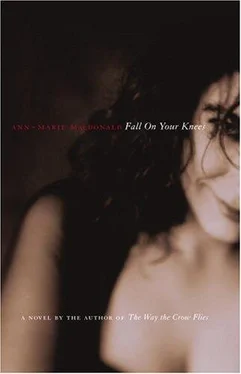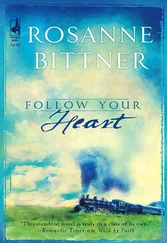What seals Kathleen’s fate, however, is the presence of several Mahmoud cousins at Holy Angels. One of them has even been in her class for the past six years. Though Materia hasn’t wanted the girls to know anything at all about the shame of family exile, and has concocted her story about “the Old Country,” James has told Kathleen the truth: Your mother and I were very young. We eloped. It was wrong, but what was worse was the behaviour of the Mahmouds. Barbaric. They are from a part of the world that hasn’t seen a moment’s peace in hundreds of years, little wonder. You have cousins at Holy Angels. Ignore them. Don’t give them the opportunity to snub you. Carry yourself like you own the place.
The Mahmouds are rich and civic-minded. The Mahmoud girls are popular, each of them a gleaming clear-eyed olive in plaid and perfect English. They have been told that Kathleen is the daughter of the Devil, and have duly accorded her a wide berth. To befriend Kathleen is to offend the Mahmoud girls. You can’t have it both ways.
But is there not one potential friend among the horde, one bookish girl, plain as a rainy Tuesday, or so beautiful as to be unafraid? One who does not travel with the pack, who might come forward as a friend for Kathleen? No. Kathleen’s fortress, her tower of creamy white, is steep and terrible. No one comes in or out. Except for her father, Sister Saint Cecilia and a select few minions necessary to support life. Such as her mother. Such as the buggy driver.
The other girls salve their corrosive envy and allay their fear of Kathleen, the antisocial prodigy, with an invigorating dose of racial hatred:
“She may be peaches and cream but you should see her mother … black as the ace of spades, my dear.”
“You know that sort of thing stays in the blood. Evangeline Campbell’s mother’s cousin knows a girl had a baby in Louisburg? Black as coal, my dear, and the both their families white as snow and blond blond.”
“We should’ve never let the coloureds into this country in the first place.”
“My uncle saw a coloured woman driving a cart with a load of coal, the next morning he was dead.”
“They have a smell, they do.”
“Kathleen Piper belongs in The Coke Ovens!”
And they laugh.
Naturally, this remedy is never indulged when the Mahmoud girls are around. That wouldn’t do, they’re nice girls and rich rich. The brothers of Holy Angels have already begun lining up.
No girlfriend has ever made it up to the tower chamber.
Frances has discovered a new game: exploring the mysteries of the teenager, Kathleen. Unfortunately, she is too young to know how to investigate thoroughly without leaving a trace.
“Come here, you little brat.”
Frances peeks out from behind Mercedes with a guilty twinkle in her eye, her hands folded innocently behind her back, and enters Kathleen’s boudoir.
“If you come in here again I’ll tell Pete to get after you,” says Kathleen, enthroned at her vanity, where she has just discovered the comb where the brush should be and a candy heart gumming up one of her good lace hankies.
“Who’s Pete?” asks Frances.
“He’s the bodechean and he’s going to drag you to hell!”
Frances laughs. Mercedes’s eyes grow round as saucers and she says, “That’s not nice.”
“Not you, sweetie.” Kathleen holds out her arms and Mercedes approaches. Kathleen pops her onto her knee. “He doesn’t get after good little girls. What shall we read?”
“Water Babies.” Mercedes chooses Frances’s favourite out of love for her little sister, who doesn’t mean to be naughty.
Kathleen eyes Frances’s crooked grin. “Come here, you rascal, you can listen too.”
Frances climbs onto the other knee. The two little girls look at each other and squirm, hands clamped over their mouths, cheeks ballooning with suppressed rapture.
“Quit wriggling or I’ll stick you on a pin and use you for bait in the creek.”
Mercedes composes herself; Frances shrieks with laughter and asks, “Can I play with your hair?”
“What do you say?”
“Please.”
“What else?”
“With a whole bunch of cream and a cherry and fruit and candy.”
“What else?”
“And a sword and a bug and a worm. And a bare bum!”
Mercedes says to herself on behalf of Frances, “Sorry dear God.” Kathleen laughs and Frances giggles passionately, poised to plunge both hands into the red sea, but Kathleen holds out,
“What word am I thinking of?”
“Lantern.”
“Nope.”
“Stick.”
“Nope.”
“Matchbox.”
“No.”
“Teapot.”
“Right.”
“Yay!”
“Don’t pull it or I’ll skin you. ‘Once upon a time there was a little chimney sweep….
Kathleen has taken to spending time with her little sisters. At first she does this for Daddy’s sake, because she knows that otherwise they get nothing but their mother’s barbaric yammer during the day while she’s at school — she can smell it hanging in the air when she gets home. But as the school-days and the war drag along and Kathleen becomes lonelier, she grows to cherish the time with her little sisters every bit as much as they do. Sunday mornings, she allows them to sit on two stools at the threshold of her room — “If I’m in the mood” — and witness her toilette. They sit as still as they can, enthralled, while Kathleen sings the world’s greatest songs in her opera voice, and slips on a white cotton blouse over her lace-embroidered petticoat. She turns the cuffs, fashions a Windsor knot in her striped silk tie, and pulls on her tan linen skirt, flared at the ankle — “My bicycling costume,” she calls it, although she does not possess a bicycle. Evenings after school, she stands with her arms akimbo at the door to the forbidden chamber, and groans, “Oh all right, you can come in. But not a peep! I’m studying.”
The little girls always cross the threshold with a sense of awe, for Kathleen’s room is a temple of sophistication. Its shelves are lined with every girls’ book you could ever think of, from Little Women to Anne of Green Gables . Its walls are plastered with pictures of great artists and beautiful underthings cut from magazines.
There is a picture of a man with wild hair and a flying necktie, pouncing upon the keys of a piano. This is Liszt. Kathleen is in love with Liszt. Kathleen says even his name sounds like a romantic sigh. Mercedes and Frances breathe the name to each other as a kind of all-purpose adjective for everything divine: Jell-O, fresh bed linen, Mumma’s molasses cookies, all are wonderfully “Liszt!”
There is a picture of a beautiful dark woman in a wide hat and an old-fashioned dress cut low, with a rose in her lap. This is Maria Malibran. “La Malibran,” Kathleen says dramatically, “the greatest singer who ever lived.” Kathleen has told Frances and Mercedes the tragic story of how Malibran went out riding on the wildest horse in the stable. She fell, caught her foot in the stirrup and was dragged over stones for a mile. She got up, powdered her cuts and bruises and sang that very night — beautifully, as usual. Then she died of a swollen brain and “she was only twenty-eight.” Mercedes always says a little prayer to herself for Malibran, while Frances tries to put the pretty lady in the picture together with the idea of her being dragged with her head bonking along. It’s terrible.
There is a big poster of “the woman of a thousand faces” — although in the poster she has only one. Her name is Eleonora Duse. She has burning dark eyes and piles of black hair. Daddy sent it to Kathleen from England before he went to the Front. Duse is “the greatest actress who ever lived.” In the poster, she stands inside the front hall of a nice house. She is wearing an overcoat and her hand is reaching for the doorknob. The poster is for a scandalous play called A Doll’s House . Daddy sent it with a letter, “to remind me not to get married and wreck my career,” Kathleen has explained. Mercedes can’t understand why Kathleen would not want to get married and have babies like Mumma, but Kathleen just snorts, “Marriage is a trap, kiddo. A great big lobster trap.”
Читать дальше












